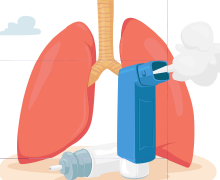The Asthma Impairment and Risk Questionnaire enhances the assessment of asthma control.
Chipps B, et al. Ann Allergy Asthma Immunol. 2023;S1081-1206(23)00308-3.
Albuterol-budesonide pressurized metered dose inhaler in patients with mild-to-moderate asthma: results of the DENALI double-blind randomized controlled trial.
Chipps BE, et al. CHEST. 2023;S0012-3692(23)00463-4. doi:10.1016/j.chest.2023.03.035.
Albuterol–budesonide fixed-dose combination rescue inhaler for asthma.
Papi A, et al. N Engl J Med. 2022;386(22):2071-2083.
2020 NAEPP guidelines update and GINA 2021—asthma care differences, overlap, and challenges.
Chipps BE, et al. J Allergy Clin Immunol Pract. 2022;10(suppl 1):S19-S30.
Patient Advocacy Organizations and Resources
Asthma and Allergy Foundation of America (AAFA)
AAFA is dedicated to improving the quality of life for people with asthma and allergic diseases through education, advocacy, and research.
American College of Allergy, Asthma & Immunology (ACAAI)
The ACAAI fosters a culture of collaboration and congeniality in which members work toward the common goals of patient care, education, advocacy, and research.
American Lung Association
The American Lung Association is the leading organization working to save lives by improving lung health and preventing lung disease through education, advocacy, and research.
American Thoracic Society (ATS)
The mission of the ATS is to improve health worldwide by advancing research, clinical care, and public health in respiratory disease, critical illness, and sleep disorders.
Chest Foundation
The CHEST Foundation creates trusted patient education resources and disease awareness campaigns that empower patients to engage in better managing their health.
Clinical Practice Guidelines
Global Strategy for Asthma Management and Prevention.
Global Initiative for Asthma, 2023.
Clinical Practice Tools
Centers for Disease Control and Prevention (CDC) Asthma Action Plans
These tools for asthma control were created following the evidence-based guidance published by the National Institutes of Health.
Asthma Impairment and Risk Questionnaire® (AIRQ)
The AIRQ® is a set of 10 yes or no questions designed to help discuss patients’ asthma control. It is intended for patients 12 years of age or older. The survey asks questions about asthma medicines, asthma symptoms, and asthma attacks.
Asthma Control Test (ACT)
This 5-question test evaluates asthma control over the past 4 weeks on a 5-point Likert scale. A score of <20 on the ACT suggests asthma that is uncontrolled.
Nathan RA, et al. J Allergy Clin Immunol. 2004;113(1):59-65.
Asthma Control Questionnaire (ACQ)
This 7-question assessment tool measures asthma control over the past 7 days. Six questions are self-administered by the patient and 1 question requires a clinician’s input. Scores range from 1 (totally controlled) to 6 (severely uncontrolled).
Juniper EF, et al. Eur Respir J. 1999;14(4):902-907.
Asthma Therapy Assessment Questionnaire (ATAQ)
This 4-question test assesses asthma control over the past 4 weeks. Each question has a possible score of 0 or 1; if the sum of the 4 question scores is >1, the patient’s asthma may be uncontrolled.
Vollmer WM, et al. Am J Respir Crit Care Med. 1999;160(5 Pt 1):1647-1652.


Assessment of Asthma Control
Module 1
| Faculty: | Bradley E. Chipps, MD, FAAP, FACAAI, FAAAAI, FCCP |
| Release: | 08/01/2023 |
| Expiration: | 08/01/2024 |


Rescue Therapies for Asthma
Module 2
| Faculty: | Bradley E. Chipps, MD, FAAP, FACAAI, FAAAAI, FCCP |
| Release: | 08/31/2023 |
| Expiration: | 08/31/2024 |


Recommendations for Rescue Therapy Use
Module 3
| Faculty: | Bradley E. Chipps, MD, FAAP, FACAAI, FAAAAI, FCCP |
| Release: | 09/15/2023 |
| Expiration: | 09/15/2024 |






